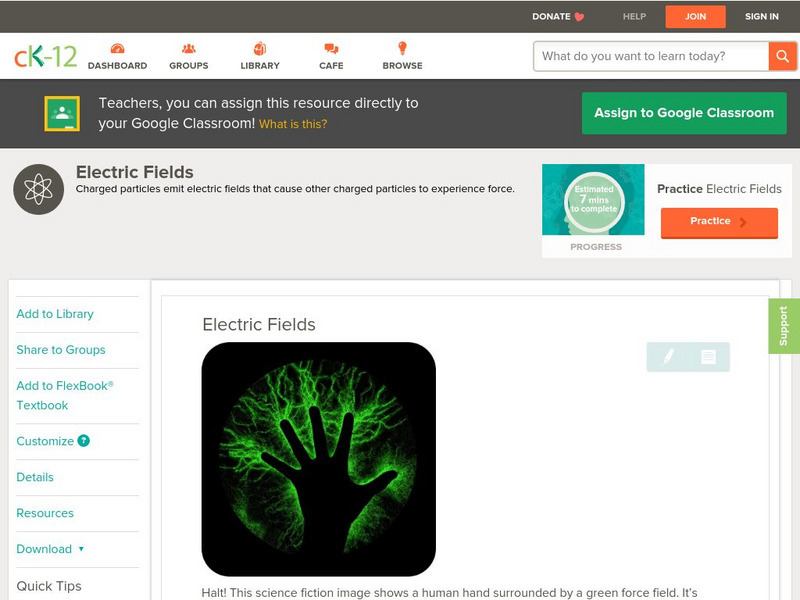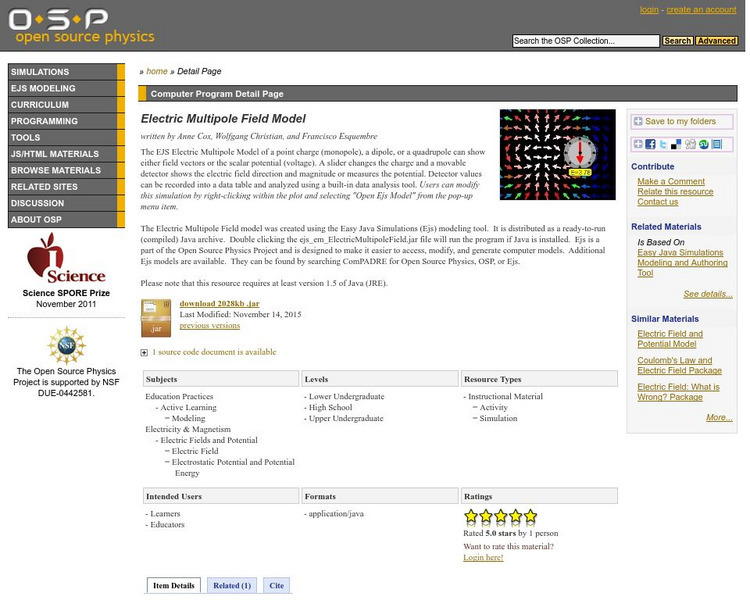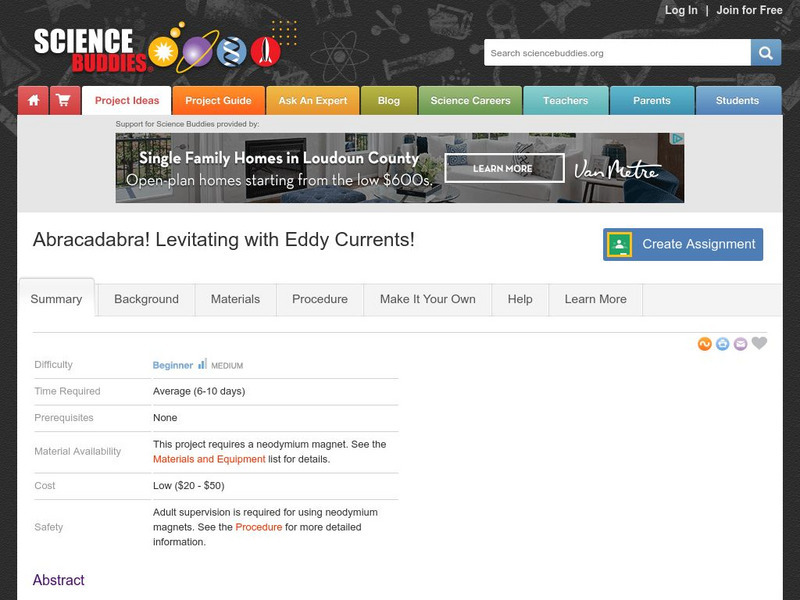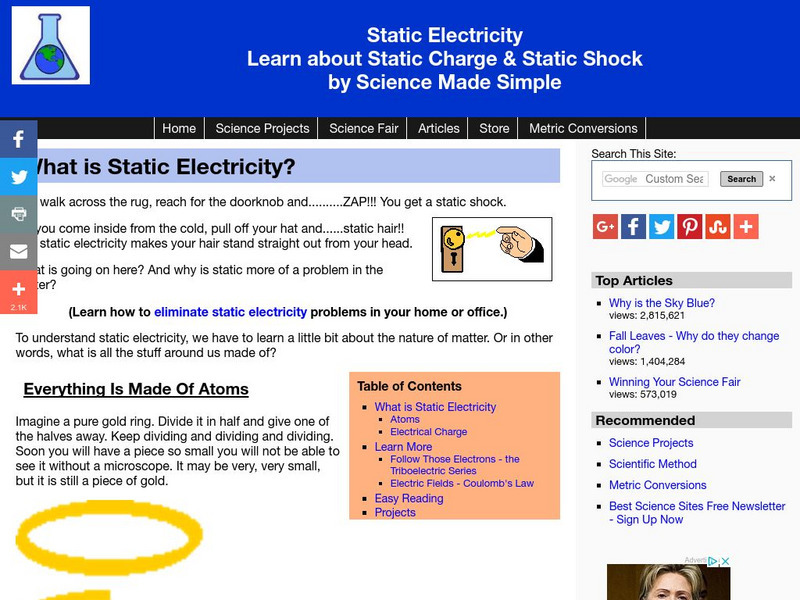Curated OER
Physics- global warming
Students discuss the concept of global warming and view a multimedia clip on the global warming phenomenon. They statistically analyze mean temperature data and compare a given set of data. Data on atmospheric CO2 is done then they...
Curated OER
Bungee Man Lab
Students explore the motion of a toy bungee jumper using the scientific method. They view a video of a bungee jumper and discuss what can be measured about a bungee jump. Students discuss the scientific mehtod and how to design an...
Curated OER
School Building Survey
Young scholars research information in their school. In this school building lesson students answer questions about their school to see how it was made, how it operates and what the energy costs are.
Teach Engineering
Exploring Energy: What Is Energy?
...Then the water heater exploded like a bomb. Using a video of an exploding water heater, the resource presents the definitions of energy, potential energy, and kinetic energy to be used in later lessons of the unit.
Teach Engineering
Exploring Energy: Kinetic and Potential
The potential of the energy in the class is moving. The third segment in a six-part unit on energy provides a deeper understanding of kinetic and potential energy. Learners understand the relationship between mass, speed, and energy and...
Teach Engineering
Penny Perfect Properties (Solid-Liquid Interations)
I can get more water to stay on a penny than you can! Collaborative pairs determine the volume of liquids that can be contained on the surface of copper pennies and plastic coins. The pairs analyze their results using graphs and go on to...
Teach Engineering
Beating the Motion Sensor
I bet I can cross the room without having the lights come on. Class members set up an experiment in which they try to determine what materials will mask motion detected by a sensor. Groups predict how materials will interact with...
Teach Engineering
Microfluidic Devices and Flow Rate
When you have to flow, you have to flow. The lesson introduces class members to microfluidic devices and their uses in medicine. They watch a short video on how the diameter affects the rate of flow. The worksheet has individuals...
Teach Engineering
Exploring Acceleration with an Android
Small groups use rubber bands to accelerate an Android device along a track of books. They collect the acceleration data and analyze it in order to determine the device's velocity.
Curated OER
Archaeologists Puzzle Pieces
Students identify how archaeologists use typology to interpret artifacts. They interpret sample artifacts as if they discovered them.
Curated OER
D'Nile Is Where It's At!
Students travel down the Nile River to survey ancient Egypt in this unit of nine lessons. Data about pharaohs, hieroglyphics, growing crops, pyramids, the geography, and the sacred rituals are explored in this unit.
CK-12 Foundation
Ck 12: Physical Science: Electric Fields
Explore what an electric field is and how electric fields interact with this module. Module includes a video, interactive activity, and review questions.
Georgia Department of Education
Ga Virtual Learning: Electric Fields and Electric Potential
In this interactive lesson unit, students will learn about electric fields and charge density. They will explore electric field diagrams and learn how they are used, as well as discover electrostatic potential energy and how it relates...
University of Colorado
University of Colorado: Ph Et Interactive Simulations: Interactive Simulations: Electric Field Hockey
Play hockey with electric charges in this interactive electric hockey simulation. Place charges on the ice, then hit start to try to get the puck in the goal. As the game is being played, view the electric field, and trace the puck's...
American Association of Physics Teachers
Com Padre Digital Library: Open Source Physics: Electric Field: What Is Wrong?
What's wrong with this model? Students expect simulations to show factual science concepts, but these particular simulations are intentionally built incorrectly. The objective is to find where the physics concerning electric fields is...
American Association of Physics Teachers
Com Padre Digital Library: Open Source Physics: Point Charge Electric Field
Investigate with the electric field around one or two charged particles at different points along a line in this physics simulation.
Georgia Department of Education
Ga Virtual Learning: Fields and Potentials of Other Distributions
In this interactive tutorial students will learn about electric potential and the principle of superposition. They will discover how superposition applies to electric fields and how electrostatic potential energy relates to electric...
American Association of Physics Teachers
Com Padre Digital Library: Open Source Physics: Electric Multipole Field Model
Simulation demonstrating how a point charge, a dipole, or a quadrupole shows field vectors or voltage. Change the charge and see the electric field direction and magnitude, and then record the detector values using a built-in data...
American Association of Physics Teachers
Com Padre Digital Library: Open Source Physics: Electric Field and Potential
An electrostatic simulation that moves beyond the two-dimensional representations a book may provide. Try this Gauss' Law model which shows the electric field and potential for cylindrical and spherical symmetry.
Khan Academy
Khan Academy: Electrical Engineering: Electrostatics
Electrostatics is the study of forces between charges, as described by Coulomb's Law. We develop the concept of an electric field surrounding charges. We work through examples of the electric field near a line, and near a plane, and...
Science Buddies
Science Buddies: Abracadabra! Levitating With Eddy Currents!
Did you know that not all trains run on tracks? Some of the world's fastest trains are magnetic levitation trains (maglev). This means that the carriage of the train is suspended over the rails with no support, but only with magnetic...
Museum of Science
Museum of Science and Industry: Online Science: Build an Electric Motor
Step-by-step illustrated instructions show how to build a simple electric motor using everyday materials to make a wire coil spin. An explanation of the science involved is given at the end, as well as tips on troubleshooting any...
American Association of Physics Teachers
Com Padre Digital Library: Open Source Physics: Charge Trajectories
Investigate a the forces exerted on a charged particle by electric and magnetic fields. Initially, find out how the charge behaves in an electric field. Then, see how the charge behaves in a magnetic field. Finally, initiate both fields...
Science Made Simple
Science Made Simple: Static Electricity
This website has three different projects from which to choose on the topic of static electricity. Scroll up to learn more about static electricity.




















